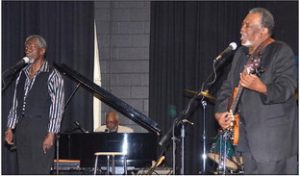
Share This Article On Social Media:
Explore Similar Categories:
By Larry Chowning
Sherman Holmes Jr. and his younger brother Wendell grew up at Christchurch in Middlesex County, attended the all-black St. Clare Walker High School (Wolverines) and both were stars in the late 1950s and early 60s Wolverine band. They went on to become stars.
Born just 74 years after slavery, Sherman and Wendell went on to become a national and international musical group known as the “Holmes Brothers.” Their Americana style of music combined a mixture of blues, soul, gospel, country and rhythm and blues.
After decades of singing and playing across the country, Sherman, Wendell and Popsy Di xon formed the Holmes Brothers in 1979. They signed record contracts in 1989 with Rounder Records and in 2001 with Alligator Records. The Alligator album “Speaking in Tongues” was critically acclaimed. The Chicago Tribune called it a “joyous, footstomping carnival . . . a gift to the world of music.”
They performed in 58 countries, sang for President Bill Clinton, appeared on the Late Show with David Letterman, CBS Saturday Early Show, and numerous other shows.
They won the Blues W.C. Handy Music award for being the Memphisbased band of the year in 2005, and the Soul Blues Album of the Year award in 2008. In 2014, The Holmes Brothers received the National Heritage Award, an award that honors those who preserve America’s historical character. And it all started right here in Middlesex County.
Music history
During slavery there were moments, even for the most down trodden, when no master or overseer could restrain the emotions of love and happiness, and music often provided an outlet for these emotions. Whether digging potatoes, picking corn or pulling fodder in the fields; tonging oysters on the river; shucking oysters in an oyster house; or pulling menhaden nets—African-American songs often filled the air.
Dr. Tommy L. Bogger, author of “A History of African-Americans in Middlesex County 1646-1992,” wrote, “Even before they (African-Americans) had access to expensive instruments, they drew melodious sounds from common household implements such as the wash tub, the wash board, and the saw. They sang as they worked, they sang when they were happy, they sang when they were sad, and in their weekly religious services, they sang with fervor and open hearts in praise of their Savior.”
When slavery ended and mandated public education came for Middlesex African-Americans, musical notes were taught in all-black public schools along with the ABC’s.
Between 1890 and 1900, a brass band composed of two Middlesex native musicians, John Mingo Banks and Hamilton Lightfoot, both of Locust Hill traveled extensively to play music in the North. They eventually traveled to England and performed for Queen Victoria.
After the turn of the 20th century, Sears Roebuck and Co. provided an easy avenue for the purchase of musical instruments and with this came local African-American bands accompanied with brass instruments, violins, harmonicas and guitars.
Local churches encouraged music. John Baylor Holmes, a former slave, played the violin at Calvary Baptist on a regular basis along with Washington (Wash) Thornton on the mandolin and Lynn Davis of Stormont on the French horn. Local bands played at baseball games, at events on Memorial Day, Emancipation Day and Independence Day. Each community had their own singing quartets and bands that sang and played regularly at church and other events.
During the 1950s, the St. Clare Walker High School Band was created under the direction of Lewis
DeOliver. The band participated in band festivals in its district and a statewide festival at Virginia State University. This led to the creation of several independent rhythm and blues bands—one being the “Melotones” with a clarinet player named Sherman Holmes Jr.
Sherman and Wendell
The Holmes brothers were the sons of school teachers Easter and Sherman Holmes Sr. of Christchurch. The boys grew up singing in the Calvary Baptist Church Choir.
At an early age, Sherman and Wendell started their musical life by taking piano and organ l essons. At 11 years old Wendell got his first paying job. He earned $6 a Sunday playing organ for Grafton Baptist Church in Hartfield. Both Sherman and Wendell had natural talent when it came to playing instruments.
When the brothers were 13 and 10 years old they formed a neighborhood band and started playing at Herman Wake’s “juke joint” (dance hall) at Cooks Corner. Wake was Easter Holmes’ first cousin. “We didn’t sound like much but we could make some noise and whenever a band did not show up Herman would call us,” said Sherman. “We used to say we’d rock ‘em on Saturday night at Herman’s and save ’em on Sunday morning at church.
“Daddy liked it when we played at Herman’s but mother didn’t. Throughout our careers she referred to our lifestyle as the “sporting life” and did not accept it until we performed in front of President Bill Clinton. Then she thou ght it was alright,” said Sherman.
When the boys became part of the St. Clare Walker band Sherman took up the clarinet and excelled. He graduated from St. Clare Walker in 1957 and entered Virginia State University. Wendell continued in high school playing the trumpet and guitar and played with a band that regularly played at The Tides Inn in Irvington. “They played for tips and many a night Wendell came home with $50 in his pocket, and that was good money then,” said Sherman.
While at Virginia State Sherman studied composition and music theory and played the clarinet in the college band. While there Lloyd Price, who had the million-selling hit “Personality,” came to the school and talked Sherman into a summer musical stint in New Orleans. “He was driving a brand new Lincoln Continental and it seemed like a good opportunity,” said Sherman. That summer, Sherman said he got to experience the New Orleans music scene but had to call home for financial help to get through the summer.
When he got back to school, Holmes decided to take off a semester. In 1959 he and another student went to New York to play in a band with singer Jimmy Jones who, in 1955, had the hit song “Handy Man.” While at Virginia State Sherman had taken up the bass guitar which proved to be a real asset. “I never saw a clarinet in any of the bands in New York,” he said. “After that, I was a bass guitar player for life.
“With Jimmy Jones I was making $50 a day and that was when minimum wage was $1.10 an hour. I could work 40 hours at a regular job and not make $50,” he said.
With Jones, Sherman went all over the country and at Wendell’s graduation from St. Clare Walker High School in 1961 the two of th em left together that summer for New York and a lifetime of music. “We both loved the business but Wendell really loved it because, in part, he never liked working for anyone else,” said Sherman of his late brother.
“Wendell’s first job was helping a lady in Stormont around her yard. He went one time and never went back and, as far as I know, he never worked a steady job in his life. Music was his life!” said Sherman.
At the start of their careers, the brothers joined several bands but in 1963 they formed their own band named “The Sevilles.” The group lasted for three years but the Holmes brothers gained experience by backing up such performers as the “Impressions,” John Lee Hooker and Jerry Butler.
After that, the brothers performed regularly at blues clubs and formed working relationships with some of the top blues/folk artist in the country. The brothers regularly played in bars and night clubs in Greenwich Village. Through the 1960s and 70s, they traveled around the country playing their music. “We tried it all. I even bought myself a white cowboy hat and was singing country music,” said Sherman. “At that time I was the only black country western singer around.”
From time to time, they went their separate ways with Wendell making his living exclusively with his music. During the 1970s, the disco sound took singing gigs away from blues and soul singers. “We didn’t play disco,” said Sherman.
When times were tight, Sherman found full-time work. “I eventually got a day job in West Chester, New York, making light fixtures by day and working clubs with my music at night. Wendell moved to New Jersey and was working the bars and nightclubs in that area.”
In 1967 Wendell started playing with Willie “Popsy” Dixon, a drummer and singer. Along with Sherman, they started performing with a succession of Top 40 bar bands. They worked bars into the late 1970s when the brothers and Dixon were about to give it all up. Instead they decided to leave the bands and try it as a trio. “We decided we would go trio and when we were considering a name for our group our agent said why don’t you use your own name . . . “Holmes Brothers.” In 1979, the Holmes Brothers hit the stage and never looked back.
 “We played all over the world,” said Sherman. “We spent six weeks in West Africa on a Goodwill Ambassador Program sponsored by President George H.W. Bush. We made music in 58 countries.
“We played all over the world,” said Sherman. “We spent six weeks in West Africa on a Goodwill Ambassador Program sponsored by President George H.W. Bush. We made music in 58 countries.
“When we played for President Bill Clinton and later Vice President Al Gore we were assigned secret service people, and they even went to the bathroom with us,” said Sherman with a laugh.
“It was not always an easy life bumping around from gig to gig,” said Sherman. “But we always approached it as professional performers who felt our music was a gift.
“Wendell and I saw it as what we were supposed to be doing in life. I always had an imagination, maybe because I’m left-handed and stuttered when I was young. I found some aspects of day-to-day life to be difficult, but when I started playing my music— and that is to this day—everything seemed normal. I never saw any reason to stop.”
Wendell Holmes and Willie “Popsy” Dixon both died in 2015.
Sherman resides at Christchurch across the street from Calvary Baptist Church where it all started. He continues the group’ s legacy as the Sherman Holmes Project and plays around the country. He often plays and sings “Amazing Grace” as a tribute to the Holmes Brothers and to his own spiritual and musical heritage.
This article originally appeared in the Southside Sentinel and is republished here with their permission.


